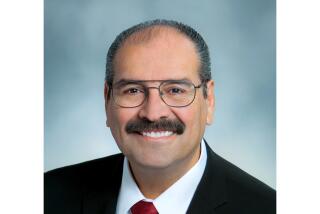Gonzales’ Fatal Flaw
- Share via
Our reasons may differ, but add our vote to the chorus of social conservative groups clamoring against a possible nomination of Alberto R. Gonzales to the Supreme Court. Because of his central role in decisions taken by the administration to flout international law in pursuing the war on terrorism, Gonzales was a poor choice for the attorney general’s office -- as we stated earlier this year -- and he would certainly be a disastrous choice for the Supreme Court.
As White House counsel, Gonzales, a longtime friend of President Bush, wrote a memo in early 2002 arguing that detainees in Afghanistan and in other war-on-terrorism theaters were not subject to Geneva Convention protections, which he shrugged off as “quaint.” Also, much to the distress of then-Secretary of State Colin L. Powell and many in the military, the White House’s chief lawyer was intent on pushing an exceedingly narrow definition of torture that allowed for prisoner mistreatment.
Had he been a responsible counselor to his client, Gonzales would have urged Bush not to take the expedient shortcuts that led to the scandals at Abu Ghraib and elsewhere, and the unlawful detention of U.S. citizens denied access to counsel.
Even Justice Antonin Scalia, among the most conservative of jurists, was outraged by the White House’s assertion, built on Gonzales’ advice, that the executive branch could suspend the rule of law to fight terrorism. “The very core of liberty secured by our Anglo-Saxon system of separated powers has been the freedom from indefinite imprisonment at the will of the executive branch,” wrote Scalia in his opinion in the case of Yaser Esam Hamdi, the U.S. citizen held incommunicado in a military brig.
Even with London’s reminder of the ubiquity of terrorism in front us, no one with such a cavalier disregard for fundamental notions of due process should serve as one of the nine guardians of our individual liberties.
It’s a sad statement of the times we live in that much of the opposition to a Gonzales nomination is coming from social conservatives, for far different reasons. They worry, on the basis of sketchy evidence, that the attorney general may be insufficiently committed to their antiabortion and anti-affirmative action crusades.
But where are the liberal advocates and Democratic senators who opposed Gonzales’ nomination as attorney general? Is a torture-supporting nominee to the court really an acceptable lesser-of-evils these days?
This editorial page does not want to see retiring Justice Sandra Day O’Connor replaced by a justice eager to overturn Roe vs. Wade. But that doesn’t mean settling for a nominee who as counsel to the president advised him that it was permissible to disregard core constitutional values and international norms.
More to Read
Get the L.A. Times Politics newsletter
Deeply reported insights into legislation, politics and policy from Sacramento, Washington and beyond. In your inbox twice per week.
You may occasionally receive promotional content from the Los Angeles Times.










